- Home
- Robert J. Harris
Will Shakespeare and the Pirate's Fire Page 10
Will Shakespeare and the Pirate's Fire Read online
Page 10
“I’ve had my fill of being threatened with my own sword,” he said with cold anger. “But I suppose it’s my own fault for teaching you to fence.”
Keeping Walter at bay with the rapier, Will pulled the book out of the saddlebag and waved it in front of him. “I found the map you hid here,” he said, his voice shaking. “The one you gave to de Vere.”
Raleigh’s eyes narrowed dangerously and he took a step closer.
Will swallowed. “Stay back,” he warned. “I’m not playacting, Walter.”
“I hadn’t reckoned you for a spy, Will,” Walter said.
“I found it by accident,” said Will, “and I can’t unsee it now.” He tossed the book down at Walter’s feet. “Are you planning an attack against the Queen? Tell me the truth”
Walter bent down slowly and picked up the book. He tapped it impatiently against the palm of his hand. “I’m telling you to put down that sword and let this alone,” he said. “It’s not what it looks like.”
“It looks like treason,” said Will. The word seemed to burn his tongue as he spoke it.
Walter fixed him with a steely stare and gestured at him with the book. “I am a loyal servant of the Queen, Will. You should look to yourself before you go accusing your friends.”
There was a threatening edge to his voice that struck Will like a glove across the cheek. “What are you talking about?”
“You answer tardily to the name Shakeshaft,” said Walter, moving closer, “from which I guess you’ve only recently assumed it. You cross yourself and call upon the saints for help, sure signs that you’ve been raised in the Roman religion. Take my word – of the two of us, it’s you that’s most likely to be taken for a traitor.”
“That’s mad!” Will declared indignantly. “I’m no traitor!”
“Oh no?”
In a lightning move Walter lunged at him. Beating the blade aside with the leather bound book, he punched Will hard in the jaw, knocking him straight back into the wall. Stunned, Will slumped to the floor and dropped the sword.
“I think you’re right, Will.” Walter’s voice sounded like it was coming from the far end of a long tunnel. “I think it’s time we know where we stand.”
Will rubbed his jaw and fought through the haze. As his mind cleared he saw that Walter had picked up the sword and set the point only inches from his heart. Slowly he pushed himself up on to his feet, his back pressed against the wall for support.
“I suppose you’re going to kill me to protect your secret,” he said, struggling to keep his voice steady, “but you’ll have to live with the shame of it.”
Walter tapped the sword point lightly against Will’s breast, then he sighed and lowered the blade. “I’m not going to kill you, Will. Your intent was honourable and you had the courage to square up to me like a man. So talking as one man to another, I’m warning you to forget all this.”
He walked back to the basin, dipped the towel in the water and tossed it to Will. “Press that to your jaw to help the swelling.”
Will dabbed his face with the towel, the cool wetness helping him shake of his dizziness. “Are you telling me I have no reason to be suspicious?” he asked.
“No,” Walter replied, “I’m saying there are plots within plots and you have no idea what a badger’s den you’re poking your nose into.”
“All I know is that you’ve been playing a part,” said Will, “just like Maddie.”
“Everyone plays a part of some sort,” said Walter, “just as you’ve been doing. All I ask of you is that you trust the honesty of my intent.”
In his heart Will knew he wanted to believe Walter was innocent. “I might do that,” he said, “if you would trust me in return. Tell me why we came to London. What’s so important about that book Maddie stole?”
Raleigh searched Will’s face for almost a full minute, then walked right up to him. He upended his sword, holding the hilt between them like a cross. “Swear,” he said. “Swear that you won’t repeat any of this and I will tell you.”
Will touched the fingers of his right hand to the sword. “I swear by God, by our Saviour, Jesus Christ, and anything else you like,” he said.
Walter nodded. He picked up the scabbard, sheathed the sword and laid it back on the bed. Will waited in silence while his companion paced the floor, collecting his thoughts.
“The title of the book is the Meta Incognita,” Walter said at last. “Have you enough Latin to translate that?”
“It means The Unknown Boundary,” said Will after a moment’s thought.
“That’s right. The name refers to what some would call the very end of the world – the frozen sea that lies beyond the northernmost shore of America.”
“Is that where you plan to look for the Philosopher’s Stone?” Will asked.
“Good God, no!” said Walter. “Where on earth did you get that idea from?”
Will swallowed his embarrassment. “Never mind. Just tell me about the Meta Incognita.”
Walter picked up his book and turned it over in his hands as he spoke. “For years Dr Dee has gathered charts, journals, legends, everything that will help him map the northern coast of America. Piece by piece he has put together all the clues that lead to the North West Passage. That’s what’s recorded in the book.”
Will concentrated, remembering the maps he had seen in Dr Dee’s library and how they faded into blank nothingness to the north of the New World. “There’s just a big empty space up there,” he said.
“Only on the maps we have now,” said Walter. “In reality it’s a twisting maze of islands and floating ice. The Northwest Passage is a route through that maze to the Pacific Ocean and the riches of China and India.”
“So it’s about money,” said Will.
“No, not money,” said Walter vehemently. “Empire! Both Spain and France would pay any price to possess the New World, but if we have control of the Passage and enough ships to dominate the sea, it will belong to England. America will be our empire.”
Will sat down on the bed, trying to contain the whole picture in his aching head. “If all this is so secret, how did Maddie know about the Meta Incognita.”
“Dee receives visitors from all over Europe,” said Walter. “One of them must have got wind of what he was up to and passed that information on to our enemies.”
“And you think they’ve paid Maddie to steal the book for them.”
“They’ll do a lot more than steal to possess the secret of the Passage,” said Walter. “They’ll kill for it!”
“And if we find Maddie at the Curtain tomorrow?”
“Steel yourself, Will,” Walter told him. “If it comes to it, we must be ready to kill too.”
17 Fallen on Hard Times
“Come see Warwick’s Men perform the appalling tragedy of Murderous Michael at Mr Burbage’s Theatre today! If you have tears, prepare to shed them! If you have blood, it will curdle at the monstrous misdeeds of Murderous Michael! Lust, Slaughter and Revenge – all new today at Mr Burbage’s Theatre!”
The crier was also waving a bill in his hand proclaiming the play’s gory magnificence and he was drawing a lively mob into the playhouse. The Theatre was a giant drum of a building, three storeys high, set in the grounds of a demolished priory. A gaudy flag fluttered above its roof, but Will could see nothing of the interior.
Further off, a sombrely clad Puritan preacher was denouncing the show. “Do not soil your souls with these lewd entertainments!” he admonished the passers-by. “It’s naught but painted wantons, godless obscenities and vices exceeding the depravity of pagan Rome!”
“I wish we could go and see that,” said Will.
Walter finished tethering his horse to a post and tossed a penny to a ragged boy who had promised to guard the animal “with my very life, sir”. He glanced over at the people filing into the Theatre and shook his head. “You’d think they see enough executions not to be impressed by fake bloodshed.”
“It sounds a lot better than
Pluto and Proserpina,” Will muttered.
Three short trumpet blasts from the Theatre pierced the afternoon sky and gave an extra spur to the crowd pressing into the playhouse.
“What was that?” Will exclaimed. “An alarm?”
“It means the play’s about to start,” said Walter. He hooked a hand round Will’s arm and tugged him away. “Come on, we’re going this way.”
They struck out for the Curtain which stood a few hundred yards south of the rival playhouse. It was similar in construction, but not so large, Will judged, nor so extravagantly painted.
“It’s an awful long way to come for a play,” said Will. “We must be at least a mile outside the city.”
“That’s the point,” said Walter. “The Lord Mayor’s a bit of a Puritan, and if he had his way, he’d see both these places shut down. Burned down even. But his authority doesn’t extend beyond the city walls.”
“Do you know what’s playing at the Curtain?” Will asked.
“No play, I’m afraid, Will. The Curtain’s fallen on hard times. Now stick close to me and watch out for pickpockets.”
They joined a smaller but equally lively crowd that was filing into the Curtain. Walter paid two pennies to a pair of thickset ex-soldiers who admitted them to the entrance passage. From brief shadow they emerged into bright sunlight and a jostling, roaring crowd.
All about them were working folk in stained aprons, countrymen in their coarse, homespun smocks, pimple-faced boys and toothless old men. Wending their way through this boisterous assembly were hawkers peddling baked apples, nuts and beer. The sandy ground at their feet was already littered with fruit peel and nutshells.
Directly ahead was a raised stage projecting out of what looked like a tall, wooden house. Henry Beeston had explained to Will that this was called the ‘tiring house’, and it was where the actors stored their props and changed costumes. Ringing the stage and the open forecourt was an encircling array of viewing galleries.
“A third hit!” exclaimed a voice from the stage. “A third hit and victory to Master Benjamin Wright!”
There was a thunder of applause and all through the teeming crowd money changed hands as bets were paid off, a few coppers here, elsewhere whole purses of cash. Up on the stage two fencers bowed and waved. A third man standing between them encouraged more applause as the swordsmen retired through a pair of doors to their rear. As they disappeared into the tiring house, Will noticed that one of them was clutching a wound in his side.
“What sort of a show is this?” he asked.
“When money’s tight it’s a lot cheaper to put on fencing bouts than plays,” replied Walter. “No actors, costumes or props, and no writers to pay either – just men with swords showing off their skill to win a small purse and a few cheers.”
“One of them was bleeding,” said Will. “Are they trying to kill each other?”
Walter shrugged. “They’re supposed to fight with blunted swords, but who’d pay good money to see that? The president up there sees to it that nobody comes to serious harm. Well, most of the time.”
Will lifted his gaze to the three tiers of galleries where seats were provided for those willing to pay more than a single penny. Here fat merchants rubbed shoulders with foppish young men, and painted women in low cut gowns preened themselves as if they were part of the show. Some even occupied private boxes that were separated off from the rest of the spectators.
“Couldn’t we afford a couple of those seats?” Will asked. “We’d have a better view from up there.”
“We’d be more conspicuous too,” said Walter, “and we don’t want to be spotted. You keep an eye peeled for your sailor friend – and for that woman.”
The president waved the crowd to silence and announced, “Our next bout is a ferocious contest between two champions of those most warlike nations, Wales and Italy!”
This brought cheers and laughter which redoubled when the two fencers appeared, each through his own door.
“A word, please, a word!” cried the president, quelling the noise. He pointed at a big, barrel-chested man in military boots. “Here on my left stands that indomitable warrior, that Alexander of the valleys, Sergeant Owen Fluellen!”
This brought a roar and shouts of, “Go to it, Welshman!”
“And on my right,” the president continued, “the mystery man from Mantua, that belligerent bravo, Graziano!”
The applause for the Italian was less enthusiastic. Somebody yelled, “Send him back home to fence with the Pope!”
The slightly-built Italian bowed graciously. He wore a jerkin of black leather over a green shirt and beneath his wide, floppy hat his face was hidden behind a red mask. Walter explained that many of the fencers chose to keep their true identities a secret.
“Gentlemen, take up your places, please!” the president instructed.
The fencers drew their swords and fell back to opposite ends of the stage to await the president’s signal. On all sides Will could hear bets being traded, mostly favouring Fluellen.
A lumpish fellow standing directly behind Will took a swig of beer and burped noisily in his ear. “I’ve seen Fluellen fight before,” he chortled. “He’d be a fool that wagers against him.”
“Thanks for the advice,” said Will, stepping away.
The president raised a red kerchief in the air, held it aloft for a count of ten, then whipped it down dramatically. The crowd bellowed encouragement as the fighters closed with each other and the president retreated to a safe distance.
Each fencer made a series of feints, trying to draw out his opponent, then Graziano bounded nimbly forward, extending his sword arm in an athletic lunge. Fluellen beat the Italian’s blade aside, but did not move quickly enough to avoid a lightning riposte from his opponent.
“Halt!” called the president. “I perceive a hit in favour of Signor Graziano!”
“Curse your eyes!” spat Fluellen. “He struck the empty air and naught else!”
The president took the Welshman by the arm and poked a finger through a rent in his sleeve. “A hit, as I say!”
Fluellen conceded with a disgruntled growl and the fencers returned to their starting places.
Walter nudged Will in the ribs. “Observe the crowd,” he said. “We’re not here for the show.”
As the spectators cheered the swordsmen on, Will swept his gaze around the galleries, hoping to spy Maddie’s sailor accomplice. He could scarcely believe it when his eye hit upon the very man he was searching for. The same wiry frame and grizzled hair, the same clothes even.
He was standing in one of the private boxes beside another man, who lounged at his ease in a cushioned chair. The seated man was richly dressed in a black velvet doublet laced with silver thread and a scarlet cloak that hung from his left shoulder. An emerald earring flashed from under his curling black locks as he followed the contest with an expert eye.
Will gave Walter a poke. “There!” he said, pointing up at the gallery. “That’s him with the belt across his shoulder.”
Walter caught at Will’s arm. “Careful!” he muttered. “We don’t want to be spotted.”
“I don’t know who the other man is.”
“I do,” said Walter. “I met him once at a banquet. He’s Don Bernardino de Mendoza, the Spanish ambassador.”
“You were right then. He must be here for the Meta Incognita.”
At that moment the president declared victory for the Italian, Graziano, and the crowd yelled their congratulations. As the cheers echoed around the playhouse, the ambassador stood up and followed the sailor out of the box towards the end of the gallery.
“Now what’s this?” Walter exclaimed. “Where are they off to?”
“It looks like they’re headed into the tiring house,” said Will.
“Then we’ll after them,” said Walter, clapping a hand to his sword, “even if we must go against the might of Spain.”
18 Crossed Swords
To the left of the stage a small s
taircase led to the tiring house. Walter elbowed his way through the crowd towards it like a galleon ploughing through a sea of flotsam with Will pressing along in his wake.
The adventurer took the three steps in one bound. At the top he pulled his sword half out of its sheath and thrust open the door. Will followed him into the tiring house where the narrow windows admitted a few thin shafts of sunlight.
Off to his right Will could see the two doors leading out on to the stage. From beyond them he could hear the excited hubbub continuing after the last fencing match. A passage leading to the back door divided the house into two curtained areas. The curtain had been pulled back from the closer half, which served both as a dressing room for the fencers and as a surgery. No one paid any attention as the two newcomers made their way along the edge of the gathering.
A physician was busy bandaging up the man Will had seen wounded in the earlier match. Fluellen was also there, thirstily gulping down a jug of wine as he watched a fresh pair of fencers limbering up.
“Show some spirit, by God!” he urged them contemptuously. “You’ll be taken for a pair of milkmaids.”
There was no sign of Graziano and Will assumed the Italian must have made off with his winnings. In vain he looked around for some trace of the Spanish ambassador and the sailor.
“Where could they have gone?” growled Walter.
“Maybe behind that other curtain there,” Will suggested.
Walter put out a stealthy hand and plucked the curtain back a few inches. From inside came a subdued murmur of voices too indistinct to make out. Squinting into the shadows, Will saw that this was where the playhouse’s props were stored.
There were pillars made of hollow plaster, small trees fixed to bases, and a horse made of patchwork and wood. Bushes, thrones, banners and folded tents were piled on top of each other in great mounds. There were even fragments of a ship heaped together like the debris of a wreck.
Crouching down, Walter motioned Will to stay close. Bent double, they crept through the mounds of stage equipment, following the sound of voices. Taking cover behind a wooden dragon with painted fire coming from its mouth, they peered out at the speakers.

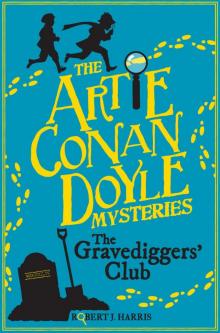 Artie Conan Doyle and the Gravediggers' Club
Artie Conan Doyle and the Gravediggers' Club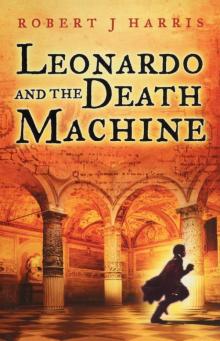 Leonardo and the Death Machine
Leonardo and the Death Machine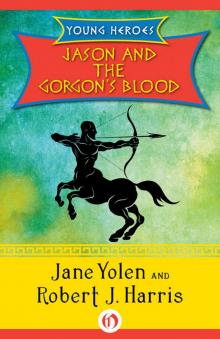 Jason and the Gorgon's Blood
Jason and the Gorgon's Blood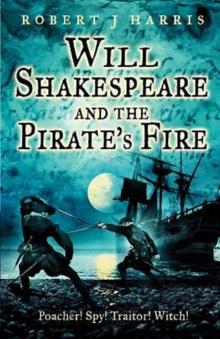 Will Shakespeare and the Pirate's Fire
Will Shakespeare and the Pirate's Fire Odysseus in the Serpent Maze
Odysseus in the Serpent Maze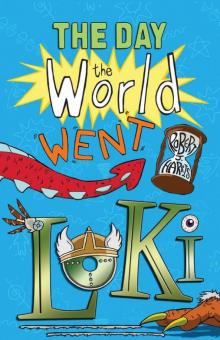 The Day the World Went Loki
The Day the World Went Loki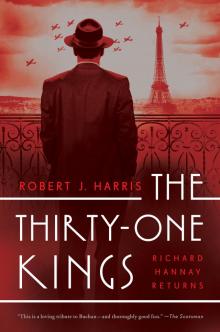 The Thirty-One Kings
The Thirty-One Kings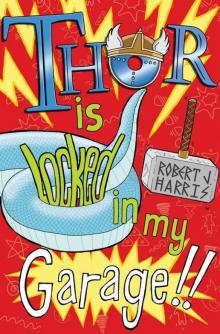 Thor Is Locked in My Garage!
Thor Is Locked in My Garage! Odin Blew Up My TV!
Odin Blew Up My TV!